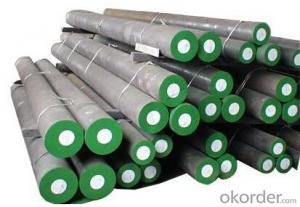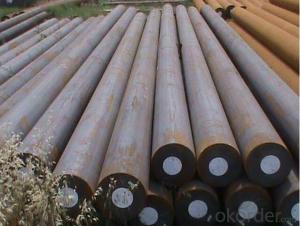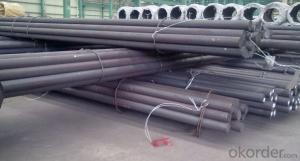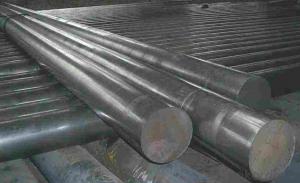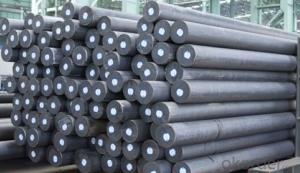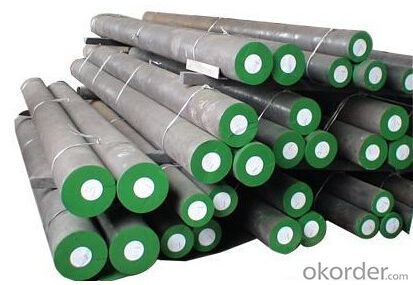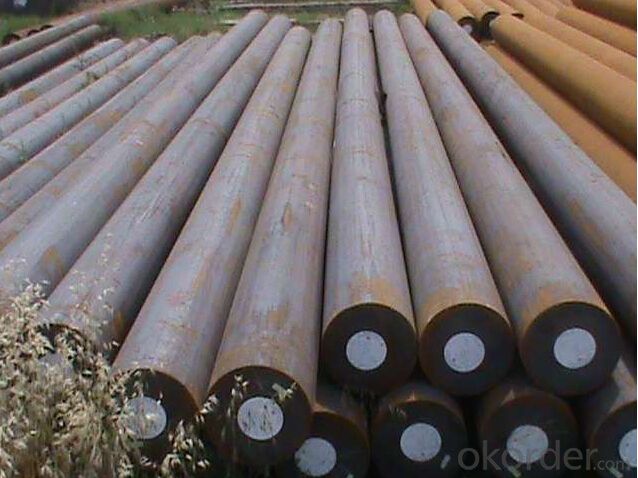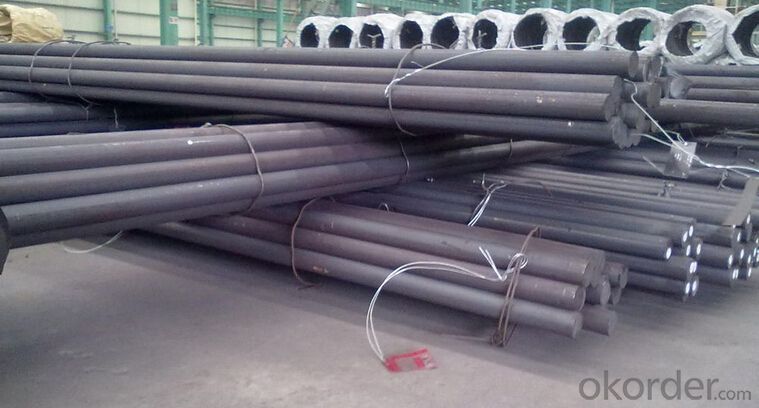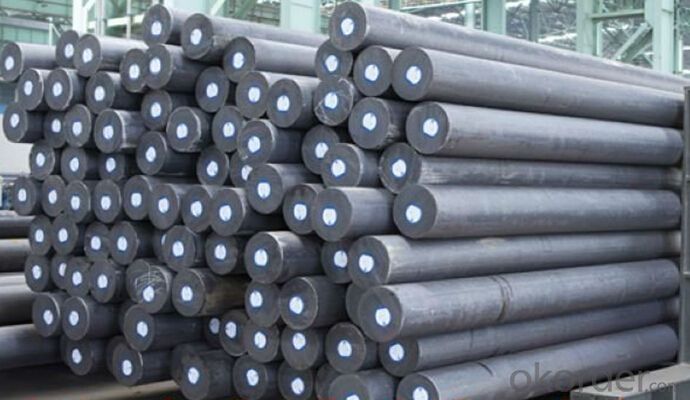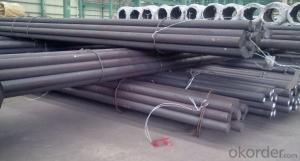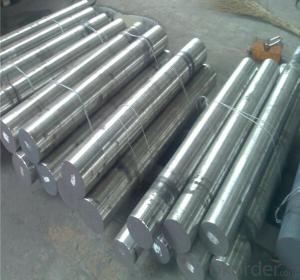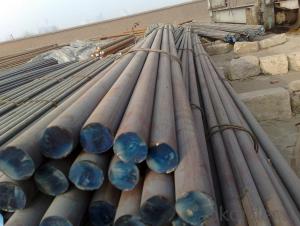Grade AISI5152 CNBM Alloy Special Steel Round Bar
- Loading Port:
- Shanghai
- Payment Terms:
- TT OR LC
- Min Order Qty:
- 30 m.t
- Supply Capability:
- 10000 m.t/month
OKorder Service Pledge
OKorder Financial Service
You Might Also Like
Specification
Specifications of Round Bar
Diameter: 4mm - 800mm
Length: Max 12m
Heat Treatment: Normalizing, Annealing, Tempering, Quenching
Chemical Composition and Mechanical Properties
Chemical Composition | Mechanical Properties(In Quenched & Tempered State) | ||
C | 0.17-0.23 | Tensile strength(MPA) | 930 |
Si | 0.17-0.37 | Yield strength (MPA) | 735 |
Mn | 0.90-1.20 | Elongation(δ5/%) | 10 |
Cr | 0.90-1.20 | Reduction in Area (ψ/%) | 45 |
Mo | 0.05 | Impact (J) | 47 |
P | ≤0.030 |
|
|
S | ≤0.030 |
|
|
V | --- | Hardness | 187HBW |
Our Featured Products
Alloy steel: Combination of steel / Bearing steel// Spring steel/ Cr- mo steel
GB 20Cr/ 40Cr / 42CrMo / 35CrMo/ 20CrMn/GCr15/30CrMnTi…
ASTM 5120 /5140 / 4140/ 4135/ 5152/52100…
JIS SCr420H/ SCr440/ SCM3/ SUP9/SUJ2…
Carbon steel: Carbon tool steel /Carbon Structural Steel
GB 20/ 35 /45/…
ASTM 1020/ 1030/1045…
JIS S20C/ S30C / S45C…
Usage and Applications of Round Bar
1. Chinese standard steel bar is often used where large amounts of steel need to be formed, for example as structural steel.
2. And we can use this kind of product on the performance of the mechanical parts if the demand is not very high.
3. Steel round bar is used in construction and a large number of architectural and engineering structures.
Packaging & Delivery of Round Bar
Packaging Detail: All goods are packed in bundle with steel strips and shipped by break bulk vessel or container (depend on target market and different ports)
Delivery Detail: 15~45 days
Trade terms: FOB, CFR, CIF
MOQ: 30 metric tons per specification; we can negotiate the quantity if the specification is normal or we have stock of one specification.
Weight: Theprice invoicing on theoretical weight basis or actual weight basis depends on customer’s request.
Shipment: The shipment of bulk break or container is depends on customer’s request and the situation of the port of destination.
Documents given: Full set of original clean on board bill of lading; Original signed commercial invoice; Original packing list; Policy of insurance; Certificate of origin and what the target market needs.
Production Flow of Round Bar
1. The common processes are preheated forging quenching, dual refinement solution process, cooling quenching and isothermal quenching. We use heat treatment for dual refinement solution process.
2. Material prepare (billet) — heat up — rough rolling — precision rolling — cooling — packing — storage and transportation
FAQ:
Q1: Why buy Materials & Equipment from OKorder.com?
A1: All products offered byOKorder.com are carefully selected from China's most reliable manufacturing enterprises. Through its ISO certifications, OKorder.com adheres to the highest standards and a commitment to supply chain safety and customer satisfaction.
Q2: How do we guarantee the quality of our products?
A2: We have established an advanced quality management system which conducts strict quality tests at every step, from raw materials to the final product. At the same time, we provide extensive follow-up service assurances as required.
Q3: How soon can we receive the product after purchase?
A3: Within three days of placing an order, we will begin production. The specific shipping date is dependent upon international and government factors, but is typically 7 to 10 workdays.
Q4: What makes stainless steel stainless?
A4: Stainless steel must contain at least 10.5 % chromium. It is this element that reacts with the oxygen in the air to form a complex chrome-oxide surface layer that is invisible but strong enough to prevent further oxygen from "staining" (rusting) the surface. Higher levels of chromium and the addition of other alloying elements such as nickel and molybdenum enhance this surface layer and improve the corrosion resistance of the stainless material.
Q5: Can stainless steel rust?
A5: Stainless does not "rust" as you think of regular steel rusting with a red oxide on the surface that flakes off. If you see red rust it is probably due to some iron particles that have contaminated the surface of the stainless steel and it is these iron particles that are rusting. Look at the source of the rusting and see if you can remove it from the surface.
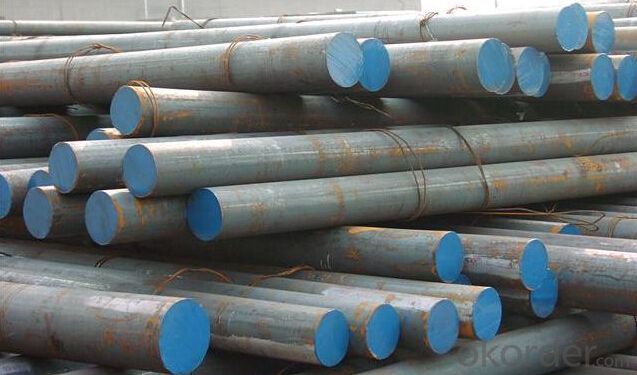
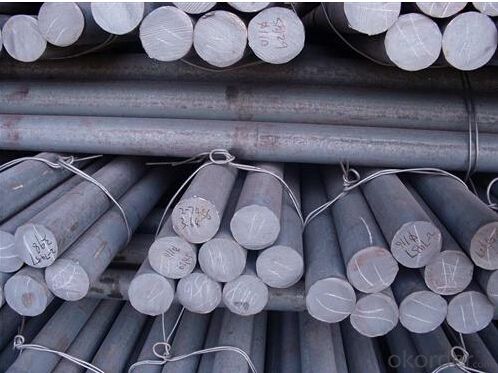
- Q: What are the applications of special steel in the manufacturing sector?
- Special steel has various applications in the manufacturing sector due to its unique properties. It is commonly used in industries such as automotive, aerospace, construction, and machinery. Special steel's high strength, corrosion resistance, and heat resistance make it ideal for manufacturing components like gears, shafts, bearings, and tools. Additionally, its ability to withstand extreme temperatures and pressures makes it suitable for applications in boilers, turbines, and pressure vessels. Overall, special steel plays a crucial role in enhancing the performance and durability of products in the manufacturing sector.
- Q: What are the requirements for special steel used in electronic components?
- The requirements for special steel used in electronic components are quite specific and stringent. Firstly, the steel must possess excellent electrical conductivity to ensure effective transmission of electrical signals within the components. This is crucial for maintaining the functionality and performance of electronic devices. Additionally, the steel used in electronic components must have high corrosion resistance to protect the components from environmental factors such as moisture, humidity, and chemical exposure. Corrosion can lead to deterioration and failure of the electronic components, so the steel must be able to withstand these potential hazards. Another important requirement is that the special steel should have low magnetic permeability. Magnetic interference can negatively impact the performance of electronic components, especially in sensitive devices such as microchips. Therefore, the steel used in electronic components should have minimal magnetic properties to prevent any interference with the operation of the components. Furthermore, the steel must have good thermal conductivity to facilitate efficient dissipation of heat generated within the electronic components. This is particularly crucial in devices that generate a significant amount of heat, as inadequate thermal conductivity can lead to overheating and potential damage to the components. Lastly, the special steel used in electronic components should have high strength and durability to ensure longevity and reliability. The components are often exposed to mechanical stress, vibrations, and other external forces, so the steel must possess the necessary strength to withstand these conditions without deformation or failure. In summary, the requirements for special steel used in electronic components include excellent electrical conductivity, high corrosion resistance, low magnetic permeability, good thermal conductivity, and high strength and durability. Meeting these requirements is essential for ensuring the optimal performance and longevity of electronic devices.
- Q: How does special steel perform in medical applications?
- Special steel performs exceptionally well in medical applications due to its unique properties. It offers high strength, durability, and corrosion resistance, making it ideal for surgical instruments, implants, and medical devices. Special steel's biocompatibility ensures it doesn't react with body tissues, reducing the risk of complications or adverse reactions. Additionally, its malleability allows for precise shaping, facilitating the production of complex medical tools. Overall, special steel contributes to the efficiency and reliability of medical procedures, improving patient outcomes.
- Q: How does special steel contribute to the aerospace industry?
- Special steel contributes to the aerospace industry by providing excellent strength, durability, and high-temperature resistance. It is crucial in manufacturing aircraft components such as engine parts, landing gear, and structural elements. Special steel's unique properties enable lighter and more fuel-efficient aircraft, enhancing performance and reducing maintenance costs. Additionally, its corrosion resistance ensures the longevity and safety of aerospace structures, making it an essential material in the industry.
- Q: What are the main advantages of using special steel in the defense industry?
- The main advantages of using special steel in the defense industry are its exceptional strength, durability, and resistance to corrosion. Special steel is able to withstand extreme conditions and high impact forces, making it ideal for producing armor, weapons, and military vehicles. Additionally, its resistance to corrosion ensures that the equipment remains functional even in harsh environments, increasing its longevity and reliability.
- Q: What are the challenges in machining special steel with high hardness?
- One of the main challenges in machining special steel with high hardness is the increased tool wear. Due to the hardness of the steel, the cutting tools used in the machining process wear out more quickly, leading to shorter tool life and increased tool replacement costs. Additionally, the high hardness of the steel makes it more difficult to achieve accurate and precise machining, as it requires higher cutting forces and can cause issues such as tool chipping or breakage. Specialized machining techniques and tools are often required to overcome these challenges and ensure successful machining of high hardness steel.
- Q: How are aluminum alloys used in the automotive industry?
- Aluminum alloys are extensively used in the automotive industry due to their lightweight, high strength, and corrosion-resistant properties. These alloys are commonly utilized in the manufacturing of various components, such as engine blocks, cylinder heads, wheels, and body panels. By incorporating aluminum alloys, vehicles can achieve improved fuel efficiency, better performance, and enhanced safety while reducing overall weight and emissions.
- Q: What are the specific requirements for special steel used in the defense sector?
- The specific requirements for special steel used in the defense sector are highly demanding due to the critical nature of its applications. These requirements include: 1. Strength and Durability: Special steel used in the defense sector must possess exceptional strength and durability to withstand extreme conditions and resist wear and tear. It should be able to withstand high levels of stress, impact, and pressure. 2. Corrosion Resistance: Defense equipment often operates in harsh environments and is exposed to elements that can cause corrosion. Therefore, special steel used in the defense sector must have excellent corrosion resistance properties to ensure the longevity and reliability of the equipment. 3. Heat Resistance: Defense applications often involve exposure to high temperatures, such as in jet engines or armored vehicle components. Special steel used in these sectors must have the ability to retain its strength and structural integrity even at high temperatures. 4. Machinability and Weldability: Special steel used in the defense sector should have good machinability and weldability characteristics to facilitate the manufacturing and assembly processes. This allows for ease of fabrication, repair, and maintenance of the defense equipment. 5. Hardness and Toughness: Defense applications require special steel to have a combination of hardness and toughness. It should be able to resist penetration and deformation while maintaining the ability to absorb energy and resist fracture. 6. Non-Magnetic Properties: In certain defense applications, such as submarines and magnetic resonance imaging (MRI) equipment, non-magnetic properties are crucial. Special steel used in these sectors must possess low magnetic permeability to avoid interference with sensitive electronic systems. 7. Certification and Compliance: Special steel used in the defense sector must meet specific certification and compliance standards, such as those set by defense organizations or international quality management systems like ISO 9001. These standards ensure the quality, traceability, and reliability of the steel. Meeting these specific requirements for special steel used in the defense sector is vital to ensure the safety, effectiveness, and longevity of defense equipment and systems. Stringent testing and quality control processes are implemented to guarantee that the steel meets the required specifications and standards.
- Q: Can special steel be welded?
- Yes, special steel can be welded.
- Q: What are the properties of titanium alloys?
- Titanium alloys have several properties that make them highly desirable in various industries. Firstly, they have excellent strength-to-weight ratio, which means they are strong and lightweight. This property makes them suitable for applications where strength and durability are required, such as aerospace engineering. Secondly, titanium alloys have high corrosion resistance, even in harsh environments. They form a protective oxide layer on their surface, which prevents them from corroding. This characteristic makes them ideal for marine and chemical processing industries. Thirdly, titanium alloys have a high melting point, allowing them to withstand extreme temperatures without losing their structural integrity. This property makes them suitable for applications in the automotive, defense, and power generation sectors. Furthermore, titanium alloys are biocompatible, meaning they are well-tolerated by the human body and are often used in medical implants and prosthetics. Overall, titanium alloys possess a unique combination of strength, lightweightness, corrosion resistance, high melting point, and biocompatibility, making them highly valuable and versatile materials in various industries.
Send your message to us
Grade AISI5152 CNBM Alloy Special Steel Round Bar
- Loading Port:
- Shanghai
- Payment Terms:
- TT OR LC
- Min Order Qty:
- 30 m.t
- Supply Capability:
- 10000 m.t/month
OKorder Service Pledge
OKorder Financial Service
Similar products
Hot products
Hot Searches
Related keywords
